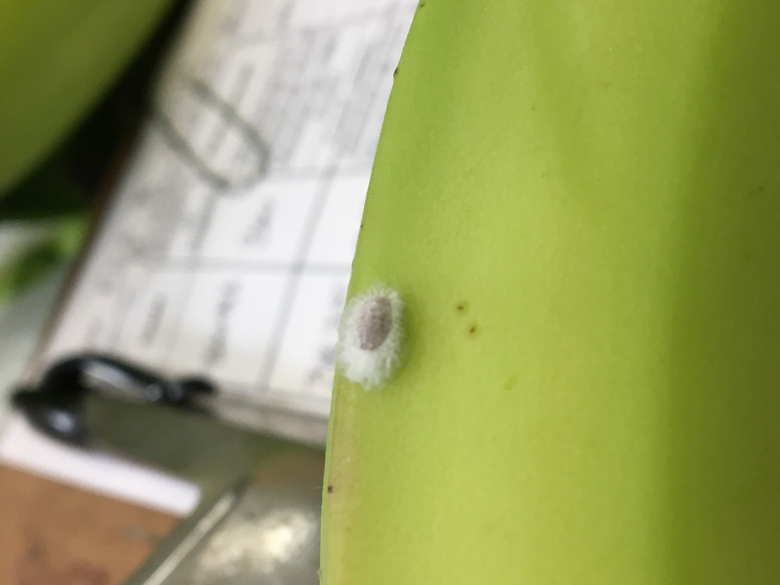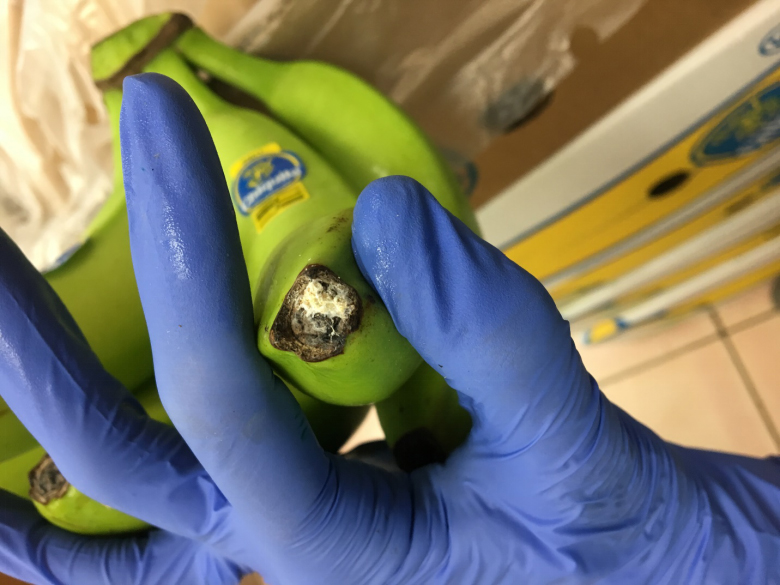Minister: Working To Find Ways To Import Bananas
The continued issues with pests being found in imported banana shipments have resulted in a banana shortage, Minister of Home Affairs Walter Roban said, adding that officials are working to with “local importers to find ways to continue to import bananas while reducing the additional costs importers have incurred.”
Speaking in the House of Assembly today [Feb 28] the Minister said, “I rise today to update this Honourable House about the island’s supply of bananas.
“You may be aware that imported bananas have until recently been the number one selling item for many grocery stores. Unfortunately over the past year they have been a times very hard to find and at the moment there are none to be found on our shelves. This is due to due to continued contamination of pests being found in imported banana shipments.
Intercepted live adult mealybug, banana shipment, 2019
“The issue first came to the attention of the Department of Environment and Natural Resources [DENR] in November 2018 when many bunches of imported bananas were found to be infested with two insect pests – scale and mealybug. The bananas were grown in South and Central America and shipped into Bermuda through U.S. suppliers.
“Further inspections of local distributors and grocery stores at that time revealed the infestation with these pests to be widespread throughout all imported bananas. Infested fruit were immediately removed from the shelves of grocery stores and destroyed as a result of the presence of these insect pests.
“The number of live mealybug and mealybug eggs found was alarmingly high and posed a serious risk to Bermuda’s banana industry, local crops and ornamental plants. The scale insect infestation was equally concerning as live scale and eggs were detected on all parts of the imported banana fruit.
Intercepted viable mealybug egg mass in tip end of banana bunch, 2019
“Plant biosecurity is of paramount importance to any country to safeguard food security, sustainability of agricultural and horticultural production, and also protects the livelihood of farmers and landscapers.
“As a result of tireless efforts of the DENR Plant Protection Laboratory, Bermuda is still free from many devastating pests which are causing serious damage and losses elsewhere. It is essential to continue to prevent the entry, establishment and spread of these invasive pests as they could wreak havoc in Bermuda.
“DENR has been working together with local importers to find ways to continue to import bananas while reducing the additional costs importers have incurred through the necessary inspection process which screen the shipments for these pests.”
The Minister’s full statement follows below:
Mr. Speaker, I rise today to update this Honourable House about the island’s supply of bananas.
Mr. Speaker, Despite the fact we can grow “just about anything here” and there seems to be bananas, mainly Cavendish type, growing in many corners of the island; we are just not able to grow enough commercially to accommodate the demand of this nutritious and delicious fruit for our local and visiting population. Further our Bermuda grown bananas are susceptible to major losses caused by storm damage. We have estimated that upwards of ninety [90] per cent of local banana crops were “decimated” when Hurricane Humberto, a Category 3 storm, brushed the island last September. It is likely that it will take some eighteen months [18] months for a full recovery.
Mr. Speaker, Bananas are not just a popular fruit but considered a major staple for consumers. You may be aware that imported bananas have until recently been the number one selling item for many grocery stores. Unfortunately over the past year they have been a times very hard to find and at the moment there are none to be found on our shelves. This is due to due to continued contamination of pests being found in imported banana shipments.
Mr. Speaker, The issue first came to the attention of the Department of Environment and Natural Resources [DENR] in November 2018 when many bunches of imported bananas were found to be infested with two insect pests – scale and mealybug. The bananas were grown in South and Central America and shipped into Bermuda through U.S. suppliers.
Further inspections of local distributors and grocery stores at that time revealed the infestation with these pests to be widespread throughout all imported bananas. Infested fruit were immediately removed from the shelves of grocery stores and destroyed as a result of the presence of these insect pests.
Mr. Speaker, The number of live mealybug and mealybug eggs found was alarmingly high and posed a serious risk to Bermuda’s banana industry, local crops and ornamental plants. The scale insect infestation was equally concerning as live scale and eggs were detected on all parts of the imported banana fruit.
Samples of the mealybug were sent to the Division of Plant Industry in Gainesville, Florida for identification. The mealybug was identified as a species that is not known to occur in Bermuda.
Mr. Speaker, Plant biosecurity is of paramount importance to any country to safeguard food security, sustainability of agricultural and horticultural production, and also protects the livelihood of farmers and landscapers. As a result of tireless efforts of the DENR Plant Protection Laboratory, Bermuda is still free from many devastating pests which are causing serious damage and losses elsewhere. It is essential to continue to prevent the entry, establishment and spread of these invasive pests as they could wreak havoc in Bermuda.
Mr. Speaker, Mealybugs feed off all of Bermuda’s important agricultural crops, bananas, fruit trees, as well as ornamental plants such as hibiscus, rose, croton, and palm species. Exposing these pests to the local environment could lead to their establishment on locally-grown bananas, fruit trees, ornamentals and other food crops and will result in the reduction of yield and crop quality. Further negative impacts on local plants can occur due to the transmission of viruses, leading to deformed produce, yield reduction, decline and death. Even when an intercepted insect pest is already present in Bermuda, our resident populations of similar insects have not have been exposed to the virus[es] that can be transmitted by these insects.
Mealybugs and scale are notoriously difficult to control with pesticides as both insects have waxy coverings which protect them from contact pesticides, and both pests naturally hide in crevices and cracks on plant material, which makes it very difficult for the pesticide to reach and effectively treat them. An alternative control, namely the use of systemic pesticides, can result in the accumulation of pesticides in fruit and consumable plant parts, exposing the consumer to these chemicals.
Mr. Speaker, Currently, local importers of bananas are required to have their product pre-inspected in the country of origin prior to export. Upon arrival into Bermuda, each banana shipment is then inspected by trained DENR staff. Frequently, however the DENR personnel inspect boxes which are marked as inspected overseas, only to encounter the pests on these bananas.
Therefore, despite the significant screening efforts by the Department and local importers, shipments continue to arrive on island infested with live mealy bugs and scale in all stages of their life cycle.
Mr. Speaker, However, we are confident that we can work with importers to implement a solution, causing minimal inconvenience to the public.
DENR has been working together with local importers to find ways to continue to import bananas while reducing the additional costs importers have incurred through the necessary inspection process which screen the shipments for these pests.
Proposed solutions include:
- reviewing current inspection techniques with our overseas counterparts to ensure that only clean shipments arrive in Bermuda;
- developing a system to source clean produce directly from banana growers;
- Developing a system of treatment off island for all imported bananas; and
- developing a system on-island to treat incoming shipments through the use of consumer-safe products and treatment techniques that effectively control pest infestations without damaging the produce;
Mr. Speaker, DENR has made it a priority to help facilitate Bermuda’s importers and grocery stores to bring in clean sources of bananas, as fast as possible, so as to minimize further shortages for the public.
Thank you, Mr. Speaker.




Im not in any hurry to get infected imported bananas..No rush , we don’t want it to infect our Bermuda bananas, so if the strain is sick, that is a daily staple we will have to treasure what is in island and also plaitains are very good and healthy.
Turn Cross Island into a State of the Art Agriculture Facility with a Hurricane Proof shelter,
It will be a better long term investment then de one time sailboat race for Billionaires.
I think we would be well advised to do the complete opposite of anything you say. Because you’re the village idiot.
If would better than 17 years of PLP failure, ineptitude, debt.
Bermuda is dying, stores are closing, business are shutting down…..
Idiots
A task he MIGHT be able to handle, import bananas.
#DOUBTITTHOUGH